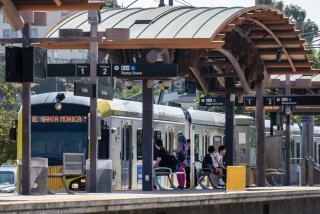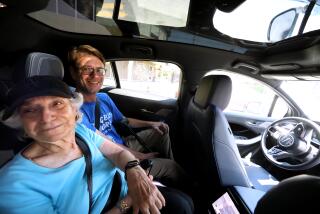Sober Way to Get Home : Safe-Rides Program Gives Lifts to Tipsy Teens
In April, 1985, Katrina Castellano was stranded at a party in Redondo Beach because a friend had too much to drink.
She called 374-CARE and half an hour later was home, courtesy of Safe-Rides, a car service that keeps teen-agers from drinking and driving.
“The ride home was nice because it was free and confidential and I didn’t have to ride with a drunk driver,” said Castellano, 16, who is one of 65 teen-age and adult volunteers participating in the Safe-Rides program in the South Bay.
It provides free rides to teen-agers who have had too much to drink or who have been stranded by a drunk friend. Sponsored by the South Bay Free Clinic, Safe-Rides also receives contributions from individuals. On a typical weekend 25 to 30 teen-agers use the service.
Would Cut Accidents
“The idea is to reduce the number of alcohol-related accidents in which teen-agers are involved,” said Craig A. Vincent-Jones, development officer for the South Bay Free Clinic.
Safe-Rides works every Friday and Saturday night, from 10 p.m. to 2 a.m. Volunteers answer phone calls, taking down a caller’s first name, location and destination; then a driver, accompanied by a rider, picks up the stranded teen-ager.
“Calls are heavily screened. When we receive a call we listen to how drunk the person sounds and ask them their age,” said Toni Alario, an adult volunteer. “We tell our kids that if there is a problem don’t worry about picking up the teen; the safety of our kids comes first.”
Safe-Rides is run out of a Hermosa Beach location that is kept secret to prevent teen-agers from showing up there and asking for rides.
Each four-hour shift has a minimum of four people: a teen-age driver, accompanying rider and dispatcher, and an adult supervisor. The dispatcher and driver remain in constant contact through two-way radios.
“The adult supervisor is present to provide moral support and help the dispatcher if needed,” said Lisa Freeze, director of the Safe-Rides program.
The driver and rider are volunteers, who receive 12 hours of training in safety procedures and counseling. The dispatchers are members of a program called Teen Advocates, which is run by the South Bay Free Clinic.
“The theory of the Teen Advocate program is that teens are more likely to go to their peers with adolescents’ problems,” Freeze said.
Training Program
The 12 Teen Advocates go through an extensive 140-hour summer training program, in which they receive instruction in substance abuse, sexuality, suicide and other teen-related issues. In addition to working Safe-Rides, Teen Advocates talk about teen-related subjects at schools, churches and community organizations. Teen Advocates are paid $3.50 per hour and work 15 to 20 hours a week.
The volunteers drive their own insured cars. They are paid for mileage and are provided with liability insurance from the Boy Scouts of America, which acts as an information and resource center for Safe-Rides throughout California.
Founded in 1983, the Safe-Rides program in the South Bay was the first program of its kind in California and the second in the nation after one in Connecticut.
In the program’s four years, more than 5,000 teen-agers have received rides home from sober drivers, Freeze said.
“Teens who use the service feel this is a way they can help a friend get home. . . . They want to prevent the tragic accident from happening,” Freeze said.
Officer Richard Richards of the California Highway Patrol said that a change in attitudes toward drinking has made the program acceptable for teens.
“Alcohol is becoming less and less acceptable in society. If you watch television, (you see that) drinking is no longer an accepted behavior. This is a result of educational programs such as Safe-Rides. It’s an excellent program,” Richards said.
More to Read
Sign up for Essential California
The most important California stories and recommendations in your inbox every morning.
You may occasionally receive promotional content from the Los Angeles Times.










